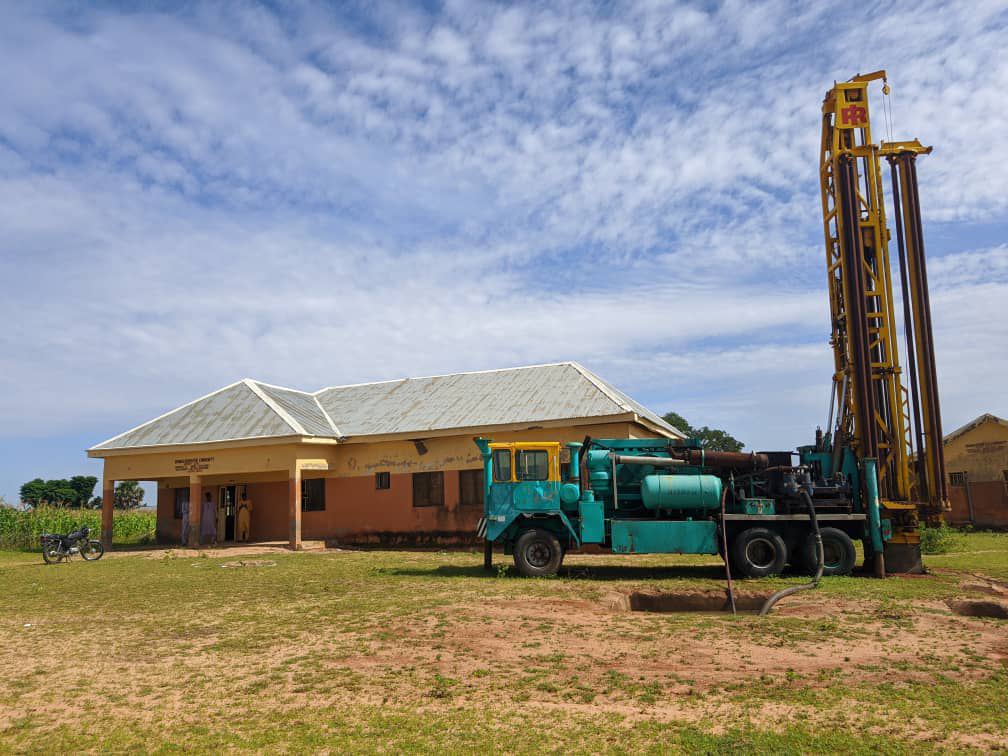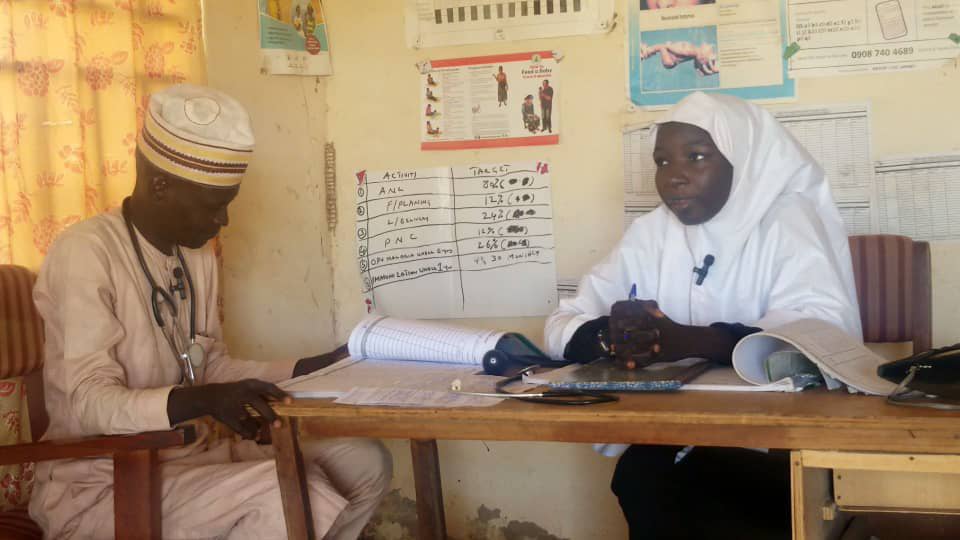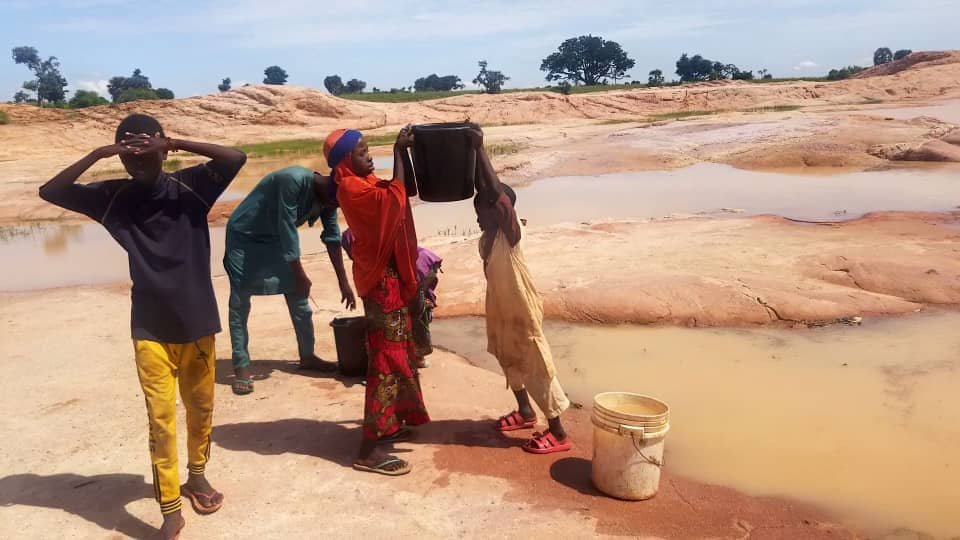In this investigation, Elijah Akoji reports on how the hope of a Gombe community was dashed due to the abandonment of a multi-million-naira borehole project.
A multi-million naira borehole project in Sarkin Yaki community, Kwami Local Government Area of Gombe State has been abandoned despite payments made to the contractor, an investigation by DAILY NIGERIAN has shown.
Findings revealed that access to potable water remains a long-existing problem for over 3,000 residents in the community with members relying on water from dirty ponds several miles away for drinking and domestic use.
The borehole project, meant to improve the standard of living of the people of Sarkin Yaki, was awarded by the Upper Benue River Basin Authority, UBRBA, an agency under the Federal Ministry of Water Resources, in 2021 for N50m, as part of the 2021 zonal intervention project.
UBRBA is one of the river basin authorities established under Decree No. 35 of November 1987, to pursue the objectives of harnessing, developing, and conserving available land and water resources in its area of coverage.
Under its mandate, the river basin authority can award water project contracts for the benefit of residents within its coverage area. However, huge amounts of money have gone into enforcing that mandate with little to nothing to show as results, as exemplified by the experience of residents of Sarkin Yaki.
Sordid tales
Yaya Manu, the father of four children and a farmer in Sarkin Yaki community, narrates the ordeal of his family due to lack of access to clean and potable water for many years.
“We have never had a borehole, even a hand pump borehole in this community. We always rely on water from a ditch some few metres away from our community. It is from there, we source the water we use for cooking and drinking.
“For those who can afford to buy water, there is usually a reservoir owned by a member of this community where a merchant supplies him water monthly. In return, he sells this water at a very high price. We have to buy around N600 worth of water weekly for us to cook, clean, and even drink,” Mr Manu said.
At the local stream in Sarkin Yamma, there is always fierce competition for water amongst residents. Whoever gets to the stream first, gets the cleanest water. They use the water for bathing, washing, drinking, and other domestic chores.
For another resident, Halima Yunusa, who sells pap, waking up as early as 4am to look for water from a river, two kilometers away or buy water from a vendor at an expensive price is an arduous daily routine she has to indulge in if she wants to be in business.
“I now have to take local herbs daily which serve as pain killer due to how my body aches due to trekking long distances to get water. Sometimes, most of my customers must have looked for an alternative breakfast since I don’t start to fry on time because I have to get water. It’s been like that since I got married 10 years ago and started living in this community. Sometime, I go out with my first daughter who is 8 years old to fetch water,” Mrs Yunusa lamented.

A cross-section of residents who spoke with DAILY NIGERIAN said they sometimes rely on a reservoir erected by a member of the community for the supply of water. However, the reservoir can go for months without water due to poor supply of water from a neighbouring community in Ture, Kaltungo, Gombe state. When available, the water is not affordable for majority of community members who are predominantly farmers.
The traditional head of the community, Katukan Shongo, describes the situation as frustrating, adding that it makes the bathing of newborn very difficult whenever women give birth in the community.
“We buy water whenever they supply to the reservoir which often comes once in a week, and sometimes, in two weeks. We have to ration the quantity to buy even if one can afford it because a lot of people are often in need of water. “Water issue in our community is a big problem, especially when our wives give birth. Our greatest problem is how to get water after they give birth,” he stressed.
Due to this situation, waterborne diseases, especially cholera, continue to ravage rural communities in the state including Sarkin Yaki.
In 2021, the state recorded a total of 2,373 cases of the disease in three outbreaks within the year.
On September 23, the Gombe State Government declared another outbreak of cholera with no fewer than 10 deaths recorded across the state. The Executive Secretary of the Gombe State Primary Health Care Development Agency, Dr. Abdulrahman Shuaibu, said as at September 20, the number of cases has increased to 236.
Tales of borehole project abandonment across Gombe-North Senatorial district
Records from open treasury revealed that in 2021, Hapco Multihydro Systems was awarded the contract for the construction of a solar-powered borehole for the people of Shongo Sarkin Yaki community.
The company, Hapco Multihydro Systems in the same year 2021, received a total of N45m in two tranches, the sum of N29m and N15m released in the first and second tranches respectively.

Sadly, checks by DAILY NIGERIAN revealed that despite payments made to the contractor, the multi-million-naira water project which is supposed to provide relief for the people of Shongo Sarkin Yaki community has been abandoned, with just one drilling machine on site.
Danladi Salisu, a procurement expert and lecturer from the Department of Economics, Bayero University Kano, believes the construction of a solar-powered borehole from the time of the first disbursement, cannot take up to three months before commissioning.
“Construction of borehole is a special need project, and once a contractor is paid the mobilization fee, it is expected that project should commence and with the release of the second tranche, in three months such project should be completed and ready for use,” Mr Salisu said.
Findings by this reporter on an online business repository portal, NG-check.com, showed that the company does not exist. Also, a check on the Corporate Affairs Commission, CAC website, retuned; “search not found” implying that the company is not a duly registered company, yet it was awarded a multi-million naira project by UBRBDA.
Section 58 of the Public Procurement Act, 2007 was categorical about the punishment meted to public officers who violate procurement procedures in the award and execution of contracts. The law stressed that officers found wanting in circumventing the Procurement Act are liable to five or 10 years imprisonment, while section 38 of the Fiscal Responsibility Act, 2007 says it is prohibitive for contracts to be awarded to contractors without compliance with procurement procedures.
Despite the laws prohibiting awarding contracts to unqualified and non-registered companies, the Upper Benue River Basin Authority went ahead to award contract to Hapco Multihydro Systems and now cannot account for millions of naira committed to the solar-powered borehole project in Shongo Sarkin Yaki community.
Agency keeps mum
Efforts to speak with the Upper Benue River Basin Authority Project office located at Dadin-Kowa, Gombe state, as regards the Shongo Sarkin Yaki project proved abortive. The state project coordinator, Ibrahim Bala, declined request to respond to the issue, saying only the headquarters of the agency in Yola could provide necessary response.
“Only the headquarters can respond to your questions. Please call or go to our Yola office, they will furnish you the correct details,” Mr Bala said.
Isa Mbaba, the public relations officer of the Upper Benue River Basin Authority in a phone conversation, declined to speak about the project. He asked for time to find out about whether the project is a capital project of the River Basin Authority or a constituency project.
“I will like to study the project and know why it was abandoned. While that is ongoing, kindly write officially to us requesting for details about the project and address it to the Managing Director. We will receive it and answer your questions accordingly,” Mr Mbaba said.
Weeks after an official letter was written as requested by the Mr Mbaba, Upper Benue River Basin Authority is yet to respond.
Epidemic looms – Experts
The officer-in-charge of Yanma Primary Health Centre, PHC, Shongo Sarkin Yaki, Ikilima Mukhtar, described the consumption of pestiferous water as a major reason for frequent typhoid and cholera outbreaks in the community.

“Cholera remains one sickness we treat at the clinic, and this has led to many deaths in the community. Unfortunately, in a month, we often have up to 35 and 10 cases of typhoid and cholera respectively from the community,” Mrs Mukhtar said.
A community health expert with Malaria Consortium, a non-profit organization concerned with the prevention, control, and treatment of malaria and other communicable diseases, Regina Ejeh, described access to potable water as a hindrance to community development and continuous threat to national economy.
“Despite Nigeria being a signatory to the Sustainable Development Goals (SDGs), no community can be said to be developed when they can’t have access to the basic amenities like water, road and light. Government must begin to prioritize rural populace and live up to their political mandate,” she said.
Sadiq Balarabe, an expert in Environment and Water Resources, at the Bayero University said a good number of Nigerians still drink unsafe water due to the absence of running taps in their community.
“It looks like access to clean water is a luxury in Nigeria. This is one amenity no government should take for granted. A visit to health facilities will show you how many patients are being treated for waterborne diseases such as cholera, typhoid fever, diarrhea, and hepatitis A, among others which is often caused by the consumption of bad water,” he said.
Mr Balarabe noted that ensuring availability and sustainable access to safe water require a systemic and strategic approach in view of the changing climatic conditions, increasing populations, poverty, and the negative effects of human development.






